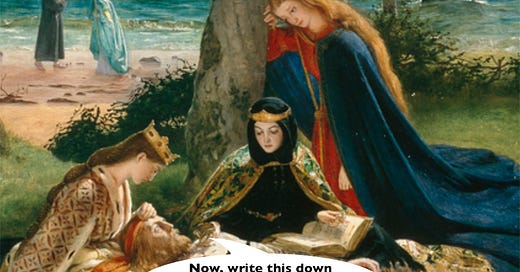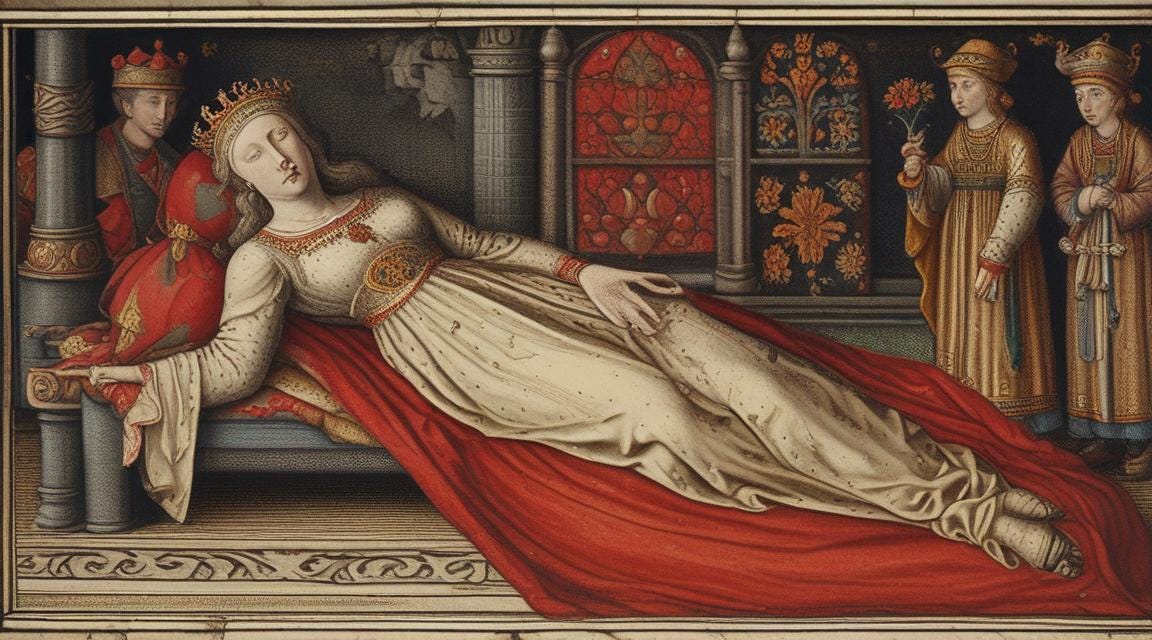The Final Words of British Monarchs Presented as Modernist Poetry
And now for something completely different.
Welcome to your Friday email for paying subscribers, with a generous teaser for everyone else.
Today, something of a shorter, more whimsical, experimental newsletter. I recently learned that Henry VIII’s dying words were supposedly “All is lost! Monks, monks, monks!”. Some people would dispute this. Inevitably. I mean, it sounds unlikely. But it got me wondering what other bizarre utterances might have issued from the mouths of our dying kings and queens. So I listed out all the known (or mythologised) last words of monarchs and the result is… interesting.
That’s for the main section. First, an announcement, and the History Radar of upcoming London history events.
📣📣 We’ve got another site visit coming up (for paying subscribers only). On the afternoon of 29 June, we’ll be taking a tour of the Cinema Museum in Kennington. It’s not only a precious museum of objects related to the film industry, but it’s also housed in an historic old workhouse building. There’s a £10 entrance fee for this one, payable on the day. If you’d like to come along, drop me a line on matt@londonist.com and I’ll pass on further details.
If you’re not yet a paying subscriber and want to (a) help support this newsletter, (b) access the full archive, (c) get invitations to events like this and (d) get a bonus newsletter every week, then click the button below. It’s less than the price of one beer each month.
History Radar
Upcoming events of interest to London history fans.
ARCHITECTURE FESTIVAL: The London Festival of Architecture is a citywide celebration of the built environment. The programme is extensive -- overwhelmingly so -- and there’s much to appeal to the history fan. This week, take an art and architecture walk around Battersea and Nine Elms, tour of the Balfron Tower, and visit an open day at Orpington Priory.
QUEER BLOOMSBURY: Gresham College’s free 11 June lecture focuses on the second Bloomsbury generation, including artists and intellectuals such as Eddy Sackville-West, Stephen Tomlin and Julia Strachey. Author and historian Nino Strachey talks about how they pushed gender boundaries and social conventions, and explored gender fluidity and pansexuality.
FLORENCE NIGHTINGALE WALK: On 13 June, take part in a guided walk by the Florence Nightingale Museum, following in the nurse's footsteps. Meet at Park Lane, and see sights including the hotel where she wrote her book Notes on Nursing, and the house where she spent her final days, before ending at the Florence Nightingale statue on Waterloo Place.
D-DAY DANCE: The National Army Museum in Chelsea stays open late on 15 June for a special 1940s-themed D-Day dance. It's open to beginners and experienced dancers, with SwingdanceUK on hand to teach you the steps to the Lindy Hop and Jitterbug. There's also live music from South London Jazz Orchestra and cabaret from the Diamond Girls, as well as hair and make-up artists on hand to help you with the '40s look.
EAST INDIA COMPANY: Part guided walk, part immersive theatre, A London Lark Rising on 15 and 16 June tells the history of the East India Company while you roam among the streets of the City. See how a Company became the most powerful corporate organisation the world has ever seen. Hear how a Company drained wealthy Mughal India of its wealth. Jostle with the merchant adventurers of the day. Walk along London’s streets in the footsteps of corrupt Company.
BLACK HISTORY CRUISE: On 16 June, take a canal boat cruise from Little Venice to King's Cross with Black History Walks, learning about the Black history of Britain's canal network as you go. Topics covered include Black scientists and inventors, racist statues, and Caribbean labour during the British Industrial Revolution. Pack a picnic to eat along the way.
GEOFFREY FLETCHER'S LONDON: Also on 16 June, join guide Jonathan Wober for a tour of some of the sites mentioned in Fletcher's much-loved book The London That Nobody Knows in the Square Mile.
The Final Words of British Monarchs Presented as Modernist Poetry
The death of a monarch is a BIG THING. Their expirations are marker points in history. We talk of the Tudor era or Victorian era, both of which are partly defined by the death of a monarch. Every schoolchild knows which king died in 1066. Half the country paid some form of respect to Elizabeth II. Someone, possibly me, even made a map of where every king and queen was born and died.
The death of a British monarch, if you’ll allow me to go a tad giddy, even defies the laws of physics. Charles became king the very femtosecond that Queen Elizabeth died. It is the only thing in the universe that shifts faster than the speed of light.
These momentous occasions are often accompanied by memorable final words. If we believe the history books (or, at least, Wikipedia), a large number of our kings and queens managed to offload something pithy or enigmatic on their deathbeds. The best of all, George V’s “Bugger Bognor”, is apocryphal, sadly. But we’re still left with a handsome stock of dying utterances, even if quite a few monarchs are absent.
I tried listing all the known “last words” out, in chronological order… and a funny thing happens. The results read like modernist poetry. Judge for yourself below (I’ve left the monarchs’ names out so it’s a bit easier to read as a poem, but this starts with William I and runs chronologically through to Edward VIII):
The Final Words of 22 English/British Monarchs as Modernist Poetry
God be merciful to me, a sinner.
Shoot, Walter, in the devil's name!
Shame, shame on a vanquished king.
Youth, I forgive thee. Loose his chains and give him 100 shillings.
Carry my bones before you on your march, for the rebels will not be able to endure the sight of me, alive or dead.
Jesus!
I will die King of England. I will not budge a foot. Treason! Treason!
We heartily desire our executors to consider how behoofful it is to be prayed for.
All is lost! Monks, monks, monks!
I am faint; Lord have mercy upon me, and take my spirit.
All my possessions for a moment of time.
I go from a corruptible to an incorruptible Crown, where no disturbance can be.
I am sorry, gentlemen, for being such a time a-dying… and let not poor Nelly starve.
Grateful – in peace!
My lord, why do you not go on. I am not afraid to die.
Can this last long?
Use it for the good of my people.
This is death.
Bertie.
I am very glad.
God damn you!
Mama…..mama…..mama.
Look, if TS Eliot had written that, then scholars would be analysing it for centuries. It’s a modernist meta-meditation on human mortality set against the continuance of the Crown. And it was all written piecemeal, one line at a time, over 900 years.






